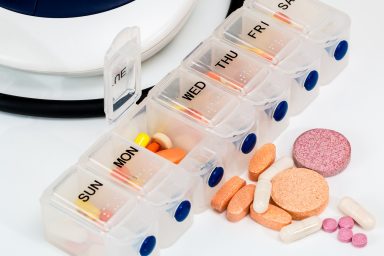 Did you know that many common pharmaceuticals can deplete nutrients from the body? Some side effects that can occur with certain medications stem directly from their effects on our nutrient status.
Did you know that many common pharmaceuticals can deplete nutrients from the body? Some side effects that can occur with certain medications stem directly from their effects on our nutrient status.
According to the Drug-Induced Nutrient Depletion Handbook—an evidence-based reference book written by pharmacists trained in clinical nutrition—drugs can cause these depletions by altering the absorption, synthesis, storage, and excretion of various nutrients.
Many people already know about certain cholesterol medications depleting the critical antioxidant CoQ10. In fact, numerous patients who take these medications have been instructed to take CoQ10 by their cardiologist because the heart, brain, and muscles tend to struggle when the body is depleted.
What’s less commonly known, however, is that CoQ10 is also depleted by blood pressure medications, blood thinners, diuretics, diabetes drugs, antibiotics, antivirals, and even acid blockers.
Here are some other common medications and the nutrients they can deplete.
- Lisinopril: Zinc, Magnesium, and Calcium
- Carvedilol: CoQ10, Melatonin
- Levothyroxine: Iron, Calcium
- Amlodipine: Melatonin, Potassium, Vitamin D, Calcium
- Metformin: CoQ10, Folate, B6, B12
- Hydrochlorothiazide: CoQ10, Magnesium, Phosphorous, Potassium, Sodium, Zinc, B1, B2, B3, B6, Vitamin C, Folate
- Birth Control (estrogens and medroxyprogesterone): Magnesium, B1, B2, B3, B6, B12, Vitamin C, Zinc, Folate, Selenium
- Fluoxetine: Folate, Iodine, Selenium, Melatonin
- Sertraline: Folate, Selenium
- Aspirin: Folate, Iron, Potassium, Sodium, Vitamin C, Calcium, B6
Take a look at all the medications you are currently taking, and make a list of which nutrients are being depleted by each one. In some cases, patients may have several drugs depleting the same nutrient. Look through your list for double, triple, or even quadruple depletions and focus on those first. Bring your list into Peoples when shopping and ask to speak with a pharmacist–they’ll help you figure out which nutrients need to be tended to first and how to do so.
If CoQ10 is at the top of your depletion inventory, which is very common, ask a Peoples Wellness Specialist to recommend a high potency, high bioavailability CoQ10. There are many to choose from at Peoples and they’ll help you make the right decision for you.
If you’re interested in figuring out which of these nutrients you may want to supplement with, you might want to book a consultation with one of our practitioners. When supplementing, it’s best to work directly with a professional in order to ensure that everything is being done safely and taken in the right form and dose in order to best support your health.
 Matt Dorsey, BSc, MAcOM, LAc is an integrative medicine consultant, licensed acupuncturist, and doctoral candidate who draws from his studies in East Asian Medicine, Acupuncture, Medical Herbology, Clinical Nutrition, Psychology, and Pharmacology to help his patients regain their health in the most well-rounded way possible. Some of his specializations include autoimmune disease, depression, anxiety, chronic pain, chronic fatigue syndrome, cardiovascular disease, and mitochondrial optimization. For more from Matt on drug-induced nutrient depletions, check out www.NutrientDepletions.com. You can also hear Matt talk about nutrient depletions on the Cultivate Wellness Podcast.
Matt Dorsey, BSc, MAcOM, LAc is an integrative medicine consultant, licensed acupuncturist, and doctoral candidate who draws from his studies in East Asian Medicine, Acupuncture, Medical Herbology, Clinical Nutrition, Psychology, and Pharmacology to help his patients regain their health in the most well-rounded way possible. Some of his specializations include autoimmune disease, depression, anxiety, chronic pain, chronic fatigue syndrome, cardiovascular disease, and mitochondrial optimization. For more from Matt on drug-induced nutrient depletions, check out www.NutrientDepletions.com. You can also hear Matt talk about nutrient depletions on the Cultivate Wellness Podcast.
Sources:
1. “Drug-Induced Nutrient Depletion Handbook” by Ross Pelton, RPh, PhD, CCN, James B. LaValle, RPh, DHM, NMD, CCN, Ernest B. Hawkins, RPh, MS, and Daniel L. Krinsky, RPh, MS.
2. “Drug Muggers” By Suzy Cohen, RPh
If you have comments and/or questions about this blog, email us at blog@peoplesrx.com.
